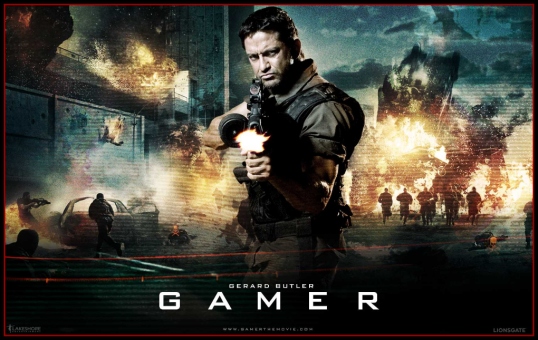Last night, Jeff and I watched the 2009 reboot of Friday the 13th.
Why Was I Watching It?
For the past two weeks, I’ve been reviewing the 12 films that make up the Friday the 13th franchise. This is the last installment so far and, appropriately enough, I’m reviewing it on Friday the 13th. (No, that’s not just a coincidence.)
What’s It About?
It’s a reboot! That’s right — forget about every other Friday the 13th film because, apparently, they never happened. Instead of trying to figure out some new gimmick to try to get audiences to watch Jason Voorhees kill yet more teenagers, producer Michael Bay and director Marcus Nisepl have simply gone back to the beginning and started all over again. (I think I saw something similar in an episode of Futurama once.)
Basically, this is the first four films all rolled into one. The film starts with a young Jason Voorhees watching as his murderous mother (Nana Visitor) gets beheaded by a camp counselor. 30 years later, Jason (now played by Derek Mears) is living in the woods around Camp Crystal Lake. A bunch of obnoxious campers come up to the Lake because they’re looking for a marijuana crop and Jason, being the culture warrior that he is, responds by killing all of them except for Whitney (played by Amanda Righetti), who he just kidnaps.
A month later, Whitney’s brother Clay (Jared Padalecki) arrives at Crystal Lake to search for his sister. Upon arriving, he runs into yet another group of obnoxious campers who have decided to take a vacation up at Crystal Lake. Jenna (Danielle Panabaker) agrees to help Clay look for Whitney and while the two of them are off searching, Jason shows up and starts killing everyone else.
What Worked?
One reason that I’m using the What Lisa Watched Last Night format to review this film is because, to a large extent, it’s pointless to get all nitpicky while reviewing a film like the reboot of Friday the 13th. This is not a film you watch because you’re looking to see something that’s going to redefine cinema. This is a film you watch so that you can scream, laugh, and grab your boyfriend. And, on all those fronts, Friday the 13th succeeds well enough. Director Marcus Nispel obviously understands the slasher genre and he provides everything that we’ve come to expect from a film like this.
Also, I have to admit, I always scream at the end of the film even though I know what’s going to happen.
The victims are all very disposable and forgettable but Aaron Yoo is funny as the token stoner.
What Did Not Work?
With this film, The Texas Chainsaw Massacre, and Conan The Barbarian, Nispel shows that while he may understand how to make a genre film, he also doesn’t seem to be capable of adding anything new to them. This isn’t a problem if you’re just looking to be entertained but, for true fans of the original films that have been rebooted by Nispel and producer Michael Bay, it’s hard not to wonder just why exactly these franchises needed a reboot as opposed to a sequel. Watching a film like Friday the 13th reboot, it’s hard not to feel as if the filmmakers simply gave up trying to bring anything new to the equation and instead rather cynically decided to just capitalize on the earlier work of filmmakers who, as opposed to Nispel and Bay, aren’t in the current mainstream of the Hollywood establishment.
The main difference between a reboot like Friday the 13th and the original films in the franchise is that the reboot cost a lot more to make. It’s a lot slicker (and therefore, you never really buy into the reality of the horror) and, with a few exceptions like Aaron Yoo, it’s full of bland actors who are recognizable from TV and who seem to be going out of their way to “act like characters in a slasher film” as opposed to at least trying to give actual performances. It almost feels as if Nispel, Bay, and the cast are specifically going out of their way to wink at us and tell us, “We’re so much better than the movie that you just paid money to see.” It feels incredibly condescending.
The film’s attempt to shoehorn the original first four films of the franchise into one 97 minute movie results in a film that often feels rather rushed.
“OMG! Just Like Me!” Moments
Oh, a lot. I would be so dead if I ever wandered into a slasher film.
Lessons Learned
From rewatching the entire Friday the 13th franchise, I learned several lessons: Don’t have premarital sex (or probably not even marital sex for that matter, Jason has got some issues), don’t drink beer, don’t smoke weed, don’t snort cocaine, don’t skinny dip, don’t go commando, don’t go in the wood, don’t go camping, don’t walking into a dark room, don’t say, “Is there anyone here?,” don’t shower, don’t sleep in abandoned cabins, don’t help out strangers, don’t hitchhike, don’t flirt, and … well, don’t do anything and you should be just fine.
However, what fun would that be?
Well, this concludes my series on the Friday the 13th franchise. I’ll be posting a few final thoughts on the franchise as a whole later tonight or on Sunday but for now, I hope you’ve enjoyed reading these reviews as much as I’ve enjoyed writing them. Stay supple and don’t go wandering around in the dark. Happy Friday the 13th!

